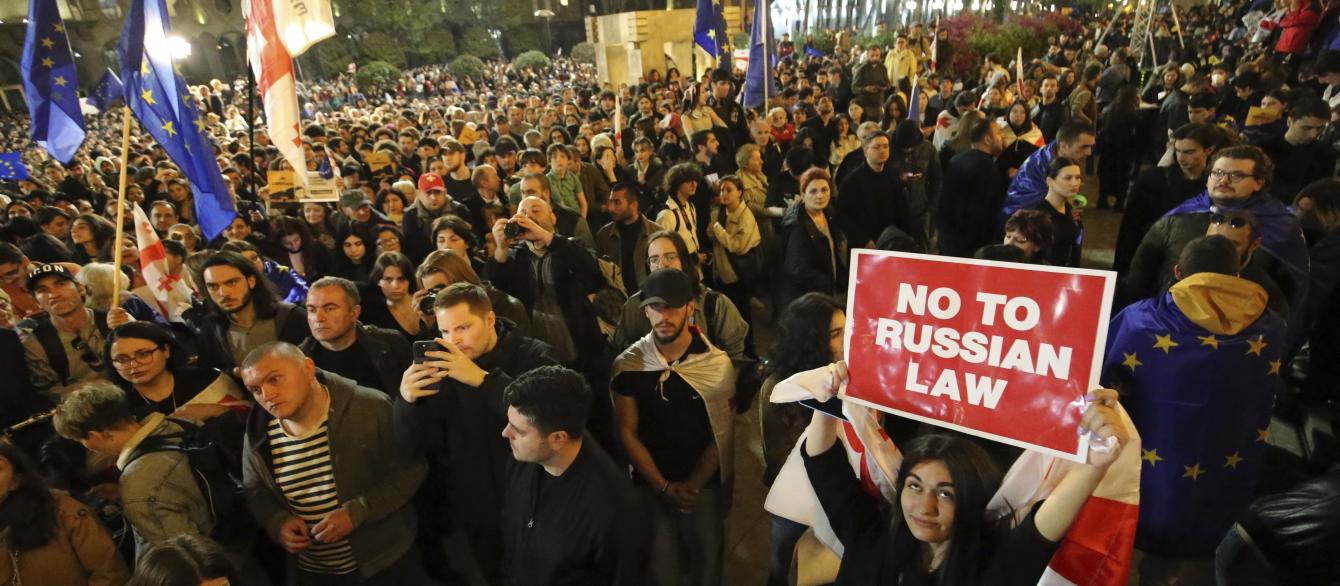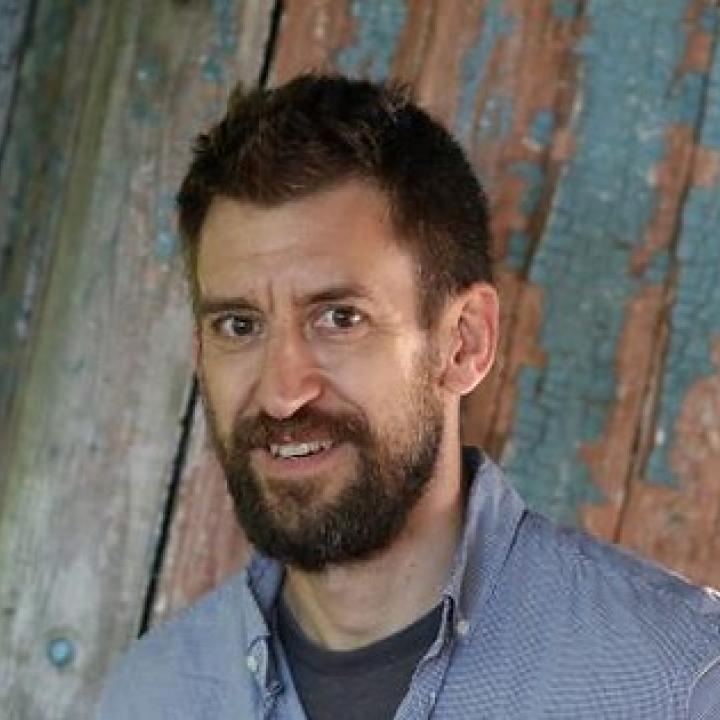This could be resolved in some ways by changing the political structure of the system so that it's not a one-party-takes-all system, in which there are mechanisms in place to ensure that the opposition, even if it loses, gets some opportunity to participate in the system.
For example, there was a proposal by the European Union a couple years back to allow opposition members to chair parliamentary commissions even though they weren't in power. It would give them some link, some sense that they weren't simply excluded and could continue to have relevance. So, there are ways that I think the structure could be changed, the ways in which participation can be stimulated and broadened. And the focus on elections is not an adequate way of dealing with this problem.
RFE/RL: So the law now that everyone is talking about, that's the center of these protests, is taking aim at these Western-funded NGOs and media, which the government has decided are preventing it from doing what it wants to do. But you argue in your recent piece that they've been ineffective. You wrote: "Despite 30 years of political and economic reform, financial support and expert advice from the EU and millions of U.S. dollars spent on democracy-building programs, nothing has undone the Georgian pattern of state control and resurgent authoritarianism." So why haven't these programs worked?
Jones: That's a good question. I think in part perhaps because they're not directed at the needs of the Georgian population. They're very often driven by donors -- whatever focus the government that provides the aid believes is necessary, that's generally what the focus is -- and there's not enough understanding or consultation with the Georgian population more broadly and the needs that they have. That's one issue.
They also very often come in for a very short period of time. They deal with an issue -- let's take for example, democratizing political parties. They work on it for three or four years. They can report some results at the end of their presence and their cooperation with the political party, and then they leave.
The changes that have to take place in Georgia to ensure the sustainability of greater transparency or greater participation or greater power sharing, I think these are really deeper systemic problems that have to be dealt with. It can't be done simply by foreign experts coming in and providing money to reform particular parts of the system.
I think the time of focusing on elections as the source of change, as has been demonstrated by Georgian Dream, which is now coming up to its fourth term in power, through an electoral system that [it] has been effectively able to manage. This is not the way that you're going to open up the system and encourage citizen participation. People are disillusioned with the elections. They don't participate, they don't know which party they want to vote for. They don't believe...that if they vote that is going to change anything in their lives....
There has to be some more thoughtful way of encouraging grassroots participation, some way to open up the system and encourage connections between political parties and the population. That's not what we're seeing right now.
RFE/RL: There is an obvious tension between the ideas that the government sees these [NGOs] as a big threat, and yet they're ineffective. How do you resolve that seeming contradiction?
Jones: There has to be some form of counterpower, some alternative in place. There has to be some method of resistance, of monitoring, of examining the government in power. Those methods are relatively weak in the system. Where is the countervailing power in Georgia? It's not in the opposition, not in the political parties. The president has the power of veto over certain legislation but very weak power [overall]....
Right now [the power is] in the streets, because there's no other mechanism in place through which people can express their opposition or effectively express their opposition to government policies. So, if we want to prevent this cycle of popular revolt every four or five years, we have to find ways in which we can guarantee some sort of diffusion of power or some sort of citizen engagement. And it has to be sustainable.
Civil society has certainly made some gains and it's very important in terms of revealing and resisting government malfeasance. This is partly why Georgian Dream wants to crush it with this new bill it's introduced.
But there are other ways. One could think of perhaps a second house [of parliament] as a way of providing mechanisms that can share the legislative process in a more diffuse way so that one party just doesn't dominate one chamber; there [would be] a second chamber that has the possibility of discussing and moderating legislation.
It could [also] be by enhancing local government, which is very weak in Georgia. It could be by creating some sort of citizen fora or mini-parliaments that would focus on particular issues that come up, which would give citizens some degree of control over the debate and maybe, particularly in local areas, the ability to actually implement legislative change.
I'm not saying that we dispense with elections, I'm just arguing that there has to be some other supplemental mechanisms in place to ensure the diffusion of power and the sharing of power, along with institutions that effectively check and monitor political power.
RFE/RL: The big question people are asking now is, why does Georgian Dream think that it needs this law on foreign agents, not just once but twice. After it failed badly last year, now they're trying again. What is it that makes it so important for them to do this?
Jones: Well, I can understand the first time that they did this, obviously it would be a mechanism to ensure greater control over the political process. Civil society doesn't have much power, but it can expose the government.... It encourages transparency. And Georgian Dream has effectively controlled other sources of political opposition, so civil society was a sort of outstanding political space where they didn't have control.
What this all suggests is that Georgian Dream is not really interested in democracy. It's more interested in managed democracy that we see in Hungary, for example. It's a political party that has significantly moved ideologically, from a party that was interested in civic engagement to one that has become increasingly isolated and focused on traditional conservative values that exclude diversity in society.
It's a way to maintain their power because they are increasingly isolated from the rest of society. The political and social base of Georgian Dream is getting narrower and narrower and now we get this very small group of people in parliament that are surrounded by a tremendous wave of popular resistance and how are they going to control that?
They have to close down the political challenges that they face and this is one way of doing it. [There's also] a fear of what getting close to the European Union might do in terms of creating greater opportunities for political challenge to their power. Those demands will no doubt come from the European Union in one way or another. And that's something that, if they want to retain power, which obviously they do, would be a significant challenge.
RFE/RL: So I understand the logic of doing this last year, but then to do it again, this I think is the question to which I have not heard a satisfactory answer. Obviously it seems to have already backfired, but why might they have tried again?
Jones: This isn't happening in isolation, this is happening in the context of increasing polarization between the West and Russia. We've seen attempts elsewhere to introduce laws like this in Hungary, for example, in Kyrgyzstan, in Abkhazia, Russia of course in 2012, arguably the model for Georgian Dream's own version.
If one was thinking in conspiratorial terms, though I generally don't do that, this might be a reflection of Russian pressure and attempts to reestablish its control while it's doing well in Ukraine at least.... Maybe this is something that is pushing Georgian Dream into adopting this law a second time. I know that there was some resistance within Georgian Dream to doing this. There was some concern that exactly this would happen. The strands that are holding Georgia to Europe are weaker and weaker and so maybe they have less to lose. They are becoming less dependent economically on Europe and European investment. Russia is increasingly the bigger market for Georgian business.... It could be something in preparation for the [parliamentary] elections in October. They want to get things in place [and] thought they would exhaust the opposition through a process like this, [and that] it would make the October elections easier for them to manage and manipulate. There are multiple potential explanations, but it's curious and, as you say, it's backfired.
RFE/RL: So, taking into account what you've said about elections, now of course we have elections coming up in October. Do you see these as potentially exacerbating the crisis or potentially resolving it? Or how do you see these in terms of Georgian political history?
Jones: Ultimately, I believe Georgian Dream is doomed because it doesn't have political or social support. It's alienated much of its support. It [does] have some support in the regions if it promotes this idea of keeping the peace and stability, it might gain some support through those ideas. Georgians don't want instability, they don't want war. This is the thing that Georgian Dream has been focusing on, and maybe they believe that this will win them the election. That probably means some sort of provocation might occur that will highlight the danger of instability. This might be part of the deal that Georgian Dream has with Russia, I don't know, that something will happen and the danger of war will be highlighted and people will vote for Georgian Dream as a party of stability. Ultimately, we have a party that really does not have the support it needs to win the election fairly. They have to cheat in some way to win this election.
RFE/RL: Even though Georgian Dream is quite unpopular, the opposition parties are even less popular, and opinion polls show that pretty regularly. So my sense going into this was that, had everything stayed the same, they would have won easily in October.
Jones: I agree with you, I would have taken that position before these events, these popular demonstrations. I don't think that's the case now. I can't imagine people turning out and voting for Georgian Dream.... It's hard to imagine that they could win this election fairly, but you're absolutely right about the opposition. Unless the opposition can form some sort of, not necessarily coalition, but some sort of agreement that would encourage people to think that it's not an opposition that's going to be dominated by the UNM [the United National Movement, the former ruling party led by Mikheil Saakashvili]. The UNM is still sort of a bogeyman....
But the other issue here is, if they do somehow manage to win the election, which of course is a possibility through their control of electoral resources, then traditionally this is the way that revolutions occur in Georgia. They very often occur after a corrupt election....
The other issue is the changed electoral system. Now we have popular proportional representation, we don't have single-majority systems. It's not exactly a winner-take-all system now. So this is going to be an interesting development because the reason proportional representation was introduced was, at some level, to introduce the possibility of smaller parties getting into parliament and, in some way, preventing Georgian Dream or the dominant party, whatever it is, from gaining a constitutional majority in parliament. So, it's more of an open electoral system, and we'll have to see what that means in terms of outcomes. It gives the opposition more opportunities.
RFE/RL: The geopolitical element of this is something that has led to a lot of speculation. Georgian Dream came into office promising that it would maintain the course toward the West, toward Europe, while also reducing the temperature in relations with Russia. Do you think that that's still the case? You've alluded a couple of times to deals that you think that Georgian Dream might be having with Russia. Do you think that we are in the beginnings of some more profound shift in their geopolitical orientation?
Jones: I think this is possible. All the indications are clearly that Georgian Dream is distancing itself from the European Union and integration into the European Union, precisely for those reasons that I mentioned before: that in order to integrate with the European Union, they're going to have to open up the political system and create vulnerabilities in terms of their own political power.
It's not a system in which Georgian Dream is going to be victorious. So, there are anxieties and fears about what getting closer to the European Union means.
If they want to gain some sort of popular support in Georgia, one way to do it would be to create some sort of deal with Russia. Of course you can never trust deals with Russia, but it might be a system in which Russia promises some improvement in terms of Georgian control over [the breakaway regions of] Abkhazia or South Ossetia, some form of confederation. These are the sort of ideas that have been passed around, that this might be a way that Georgian Dream could appeal to its population by appealing to this idea of territorial integrity.








